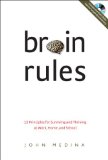
Sunday, December 21













|
Home > Leadership in the Real World Blog | |
|
Notes, links, and inspiration about topics related to personal and leadership development. |
|
|
| |
"Punish Inaction"I've become a major fan of Dev Patnaik's book Wired to Care: How Companies Prosper When They Create Widespread Empathy I'm looking forward to interviewing Dev tomorrow for an upcoming People and Projects Podcast episode.Don't wait for the interview--get the book now and start reading. While prepping for the interview I came across what I expect to be my favorite quote for this entire month, from a recent article Dev wrote for BusinessWeek. The quote is credited to Stanford University engineering professor Jim Adams who said, "Good companies reward success, punish failure, and ignore inaction. Great companies reward success and failure and punish inaction." This hits on a common theme in both my interview with Michael Roberto about his book Know What You Don't Know: How Great Leaders Prevent Problems Before They Happen and in my discussion with Ralph Heath, author of Celebrating Failure: The Power of Taking Risks, Making Mistakes and Thinking Big: we too often seek first to punish failure instead of learn from it. Yet the even greater wisdom of the quote has to do with how we deal with inaction. You be the judge. How have you seen inaction most often handled? Tolerated? Expected? Ignored? Seriously. How many times have you said, "I thought of that years ago!" as someone makes money off an idea you had in the shower but went down the drain because you didn't take action. "Punish inaction." Do you want to excel at delivering projects and leading teams? Take those strong words to heart today. And don't just consider the inaction of those on your teams and the stakeholders you work with. You and I both need to look in the mirror to consider the inaction that has been holding us back. Do you want to make big things happen this year? Reward success. Enthusiastically learn from mistakes. And develop a disdain for inaction. P.S. Have you still not taken action on getting a copy of Dev's book? :) Labels: accountability, Books I Love, executives, innovation, learning, managing stakeholders, mistakes, podcast, project management, teambuilding, teams
| |
Leaders are Readers! Here's my Recommended Reading List
If you're like me, there are a lot of books you'd love to read but they just seem to stack up in a pile of good intentions. I don't consider myself a fast reader and I can honestly say that I don't particularly enjoy reading. But this I know for sure: leaders are learners. And one very beneficial way to further your learning is to fill your mind with books and other resources that will teach, challenge, and encourage you to be more effective and make a greater impact on your career, family, and the world. I'm often asked after keynotes and workshops for a list of recommended books. I have recently added a page on our website with book recommendations that I invite you to visit! Labels: Books I Love, leadership, learning, project management
| |
"Ignorance keeps you perky"Earlier this year Peggy Noonan wrote an article about President Obama's new term: "Every new president starts out fresh, in part because he doesn't know what he doesn't know. Ignorance keeps you perky."The months since have shown that running a government is more challenging than running a campaign. Though you and I are not seeking to be the leader of the free world, Noonan's point can be translated to those who strive to deliver projects and lead teams. When we first take over a project or team, our optimism may be based on ignorance. What is it that we don't know? This all comes to mind as I prepared for my podcast interview next week with Michael Roberto, author of Know What You Don't Know: How Great Leaders Prevent Problems Before They Happen. In the book, Professor Roberto essentially tells us that leaders must first hone their skills as problem-finders, not just problem-solvers. He offers very practical advice on how leaders can overcome the many barriers that make it a challenge to discover problems earlier instead of reacting to them later when the consequences can be much more severe. The podcast episode is not scheduled to be published until late October but I invite you to get your copy of Michael's book now and enjoy the interview when it comes out. In addition, here's an article that Michael just recently published that will give you a taste for what's in store. Here's to us all becoming better problem-finders! Labels: Books I Love, conflict, crisis, denial, illusion, podcast, project management, project sponsors, risk management
| |
Brain Rules MindmapIf you've participated in one of my project management workshops you've likely heard me refer to mindmapping. It's a great technique for personal and team brainstorming. You may also have heard me refer to one of my favorite books from last year: Brain Rules: 12 Principles for Surviving and Thriving at Work, Home, and School, by John Medina. A recent podcast episode talks about the book and a few of the concepts. You may also have heard me refer to one of my favorite books from last year: Brain Rules: 12 Principles for Surviving and Thriving at Work, Home, and School, by John Medina. A recent podcast episode talks about the book and a few of the concepts.Well, here's a site that combines both: a mindmap of the Brain Rules! Enjoy! Click here to get your copy of Brain Rules. You'll love it! Labels: Books I Love, mindmaps, podcast
| |
Improving Your InfluenceHow effective are you at influencing others? How can you convince someone to agree to your proposed approach, particularly when you don't have authority over them? Or when it's not as simple as getting a bunch of facts together? Or when there may be some natural tension between what you both want? Ever get free return mailing labels from an organization asking for donations? How about free samples where you shop? As it turns out, Cialdini finds they all may not be as free as we think! In fact, researchers have found that simply giving customers a candy or mint along with their bill significantly increases tips! Actions for Leaders
Labels: Books I Love, conflict, influence, leadership, managing stakeholders |
|
|


 John Maxwell summarizes leadership in one word: Influence. One of my favorite books on the topic is from Robert B. Cialdini. In Influence: The Psychology of Persuasion, Cialdini offers up what he calls the "weapons of influence" to help us all better understand how influence works.
John Maxwell summarizes leadership in one word: Influence. One of my favorite books on the topic is from Robert B. Cialdini. In Influence: The Psychology of Persuasion, Cialdini offers up what he calls the "weapons of influence" to help us all better understand how influence works. It's reciprocity in action.
It's reciprocity in action.